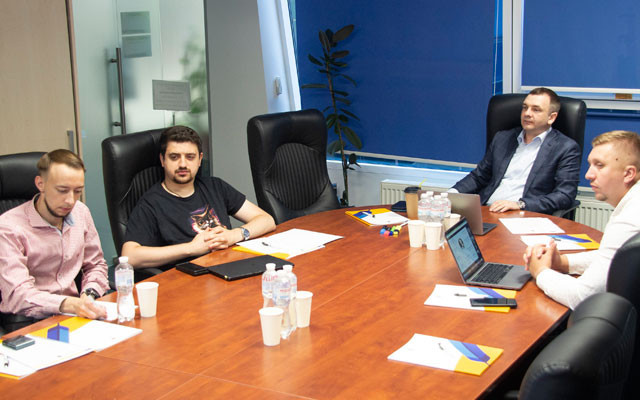
How will the EU regulate artificial intelligence (AI), and what should Ukraine expect?



The European Union is approaching adopting a regulation that will govern the use of artificial intelligence. Ukraine will also have to regulate this area. What experience should be taken into account?
This was discussed during the second meeting of the UNBA Working Group on legal Regulation of artificial intelligence, formed by the Ukrainian National Bar Association. The event was attended by representatives of the Verkhovna Rada (Parliament) Committee on Digital Transformation, the Ministry of Digital Transformation of Ukraine, the Secretariat of the Ukrainian Parliament Commissioner for Human Rights (Ombudsman), and the IT Ukraine Association.
"Today, we see problems arising from the activities of products that use artificial intelligence. This includes voice substitution, image substitution, and personality substitution. This violates the property rights of people and businesses and commits offenses," said Valentyn Gvozdiy, Chairman of the Working Group, UNBA Vice President, "The UNBA, which is the regulator of the profession in Ukraine and is a self-governing organization that unites all lawyers, has taken the initiative to start the process of developing ways of Regulation that could be proposed to our parliament in the future.
Hanna Udovenko, Senior Assistant to the Head of the Working Group, revealed the critical provisions of the draft EU Regulation on Artificial Intelligence Act.
Artificial intelligence is proposed to be defined as a machine system designed to function with varying levels of autonomy and that can produce results such as forecasts, recommendations, or decisions that affect the physical or virtual environment for explicit or implicit purposes.
The Regulation aims to promote the implementation of human-centered and reliable artificial intelligence and to ensure a high level of protection of health, safety, fundamental rights, democracy, and the rule of law, as well as the environment from the harmful effects of artificial intelligence.
To this end, the document proposes, in particular, to introduce rules for the placement on the market, commissioning, and use of AI systems; prohibitions on certain practices in the field of AI; requirements for high-risk AI systems and their operators; transparency rules for systems that interact with individuals to recognize emotions and biometric categorization and edit images, video, and audio; rules for market monitoring, market surveillance, and governance; measures to support innovation with a particular focus on SMEs and start-ups, including regulatory sandboxes and targeted measures aimed at reducing the regulatory burden (to view the entire project presentation, please follow the link).
The EU Artificial Intelligence Regulation is scheduled to come into force at the end of 2025.
We are following the European integration path, and Ukraine will have to implement the Artificial Intelligence Act, which is currently being developed for EU countries. This opinion was expressed by Mykhailo Kryachko, Chairman of the Verkhovna Rada Committee on Digital Transformation. At the same time, he noted the need to study the experience of Asian countries. "They took a different path. This is partial Regulation or deregulation in general," explained the MP. "It is clear that they do this to encourage future stakeholders to invest in their countries. Mr. Kryachko emphasized that we should remember domestic producers and study the best practices of Canada, where the emphasis is on encouraging AI.
The head of the Parliamentary Committee also suggested creating a working group based on his Committee.
Volodymyr Behei, the state expert of the expert group on the development of new technologies and digital innovations of the Digital Economy Directorate of the Ministry of Digital Transformation, recalled that in 2020, they created a Committee for the Study of Artificial Intelligence, which included developers, scientists, and researchers. Today, this Committee has 53 members. The Committee has several working groups, one of which is dedicated to the issue of Regulation.
"We are also members of the Council of Europe Committee on Artificial Intelligence. Its outcome will be a Convention - a framework document that will legally oblige the development and application of AI based on the Council of Europe standards on human rights, democracy, and the rule of law," said V. Begei. - "The main focus of our work in the Council of Europe on this Convention is on the critical issues of risks from the use of AI. The result of our work will be adopting legislation at the national level to regulate this area.
According to the expert, this issue was considered by the Committee's working group. "We considered several important issues regarding various forms and possibilities of regulating this area. In general, our vision is that any chosen path should consider the interests of national AI developers," said the Ministry of Digital Transformation representative. - "We must understand that our movement towards Europe obliges us to implement the laws of the European Commission on artificial intelligence. But we must also take into account the opinion of national producers."
Nataliia Shcherbyna, Deputy Director of the Department for Monitoring of Information Rights of the Ombudsman's Office, the Ministry of Digital Transformation, and the EU4DigitalUA project spoke about the joint work of the Ombudsman's Office and the EU4DigitalUA project.
"To prepare for any possible challenges in the field of artificial intelligence regulation, some recommendations are needed, including in terms of personal data protection, before regulations are agreed, and a regulatory model is chosen," she warned. - "We have asked our partners and EU project experts to help us with such a study of AI technologies in terms of personal data protection. And this study will have several aspects: the role of AI in the modern world, the impact of AI on human rights, legislation and ethical aspects of data protection and AI technologies, and assessment of personal data protection risks when using AI." The study of these issues is expected to result in recommendations for government agencies and industry IT companies.
The expertise of the Ukrainian National Bar Association members and the possibility of additional involvement of specialists, including those from abroad, may help develop best practices in Ukraine and implement them in our legislation. Mr. Gvozdiy expressed this opinion. "We all realize that we are now in the process of European integration. We must work as hard as possible to harmonize Ukrainian legislation with EU legislation. That is why we can welcome the proposal of Mykhailo Kryachko, Chairman of the relevant parliamentary Committee, to establish a working group under the parliament," commented the UNBA Vice President, "It is vital that those investors who come to us, companies, and dealers, should not only feel comfortable but also feel like they are in developed jurisdictions.
© 2026 Unba.org.ua Всі права захищені
"Національна Асоціація Адвокатів України". Передрук та інше використання матеріалів, що розміщені на даному веб-сайті дозволяється за умови посилання на джерело. Інтернет-видання та засоби масової інформації можуть використовувати матеріали сайту, розміщувати відео з офіційного веб-сайту Національної Асоціації Адвокатів України на власних веб-сторінках, за умови гіперпосилання на офіційний веб-сайт Національної Асоціації Адвокатів України. Заборонено передрук та використання матеріалів, у яких міститься посилання на інші інтернет-видання та засоби масової інформації. Матеріали позначені міткою "Реклама", публікуються на правах реклами.